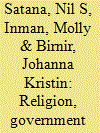|
|
|
Sort Order |
|
|
|
Items / Page
|
|
|
|
|
|
|
| Srl | Item |
| 1 |
ID:
120318


|
|
|
|
|
| Publication |
2013.
|
| Summary/Abstract |
When ethnic minority parties are excluded from government coalitions, are group attributes such as religion related to the groups' use of political violence? We argue that extremist factions within minority groups make use of divergence in religion to mobilize support for violent action when the group is excluded from government. Thus, we posit that while religion per se is not a source of violence, extremist elements of ethnic minorities, whose religion differs from the majority, may use religious divergence to mobilize group members to perpetrate terrorism. Specifically we test the hypotheses that extremist factions of an excluded group will be more likely to carry out terrorist attacks when the group's members belong to a different religion as well as when they belong to a different denomination or sect of a religion than the majority. To test these propositions, we use data on ethnic minority party inclusion in government coalitions, ethnic minority group religion, and the Global Terrorism Database (GTD) by matching perpetrators with ethnic groups for all democracies, 1970-2004.
|
|
|
|
|
|
|
|
|
|
|
|
|
|
|
|
| 2 |
ID:
092891


|
|
|
|
|
| Publication |
2009.
|
| Summary/Abstract |
Strikingly, little systematic study of the relationship between democracy and terrorism has been undertaken. This article addresses this lacuna by laying some groundwork for further analytical study of the issues. It does so, first, by suggesting a family of independent variables related to the concept of political access that might be employed in this research; and second, by introducing a more expansive set of dependent variables, which will help capture the diverse effects of political access on militant group activity. The bulk of the paper examines the variety of causal logics that could potentially connect democracy and terrorist group activity, drawing from five analytical approaches to understanding terrorist motivation evident in the literature. Two major conclusions follow from the analysis. First, the democracy and terrorism debate constitutes not one research question, but many. Second, the prediction that follows from many approaches to terrorist motivation is not that democracy should promote an easy, inevitable lessening of terrorism. Rather, a more refined understanding of when democracy, or other forms of political access, may reduce violence or yield other desirable (and undesirable) outcomes is essential.
|
|
|
|
|
|
|
|
|
|
|
|
|
|
|
|
|
|
|
|
|